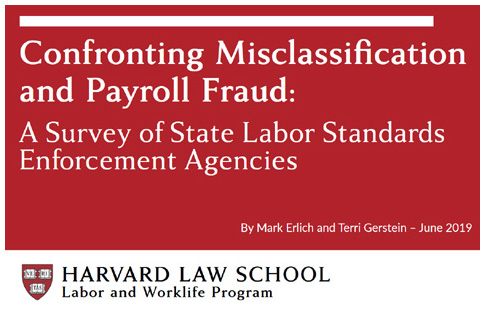 Researchers from the Harvard Labor & Worklife Program, a program of Harvard Law School, released on Wednesday a report detailing the expanding and increasingly inventive role of state-level agencies regarding enforcement of worker misclassification laws and upholding workers protections. The report, Confronting Misclassification and Payroll Fraud: A Survey of State Labor Standards Enforcement Agencies is published in the midst of a decades-long trend of employers increasingly misclassifying workers as independent contractors. More urgently, within the past two years, the federal government, through the United States Department of Labor and the National Labor Relations Board, has been increasingly rolling back worker protections and enforcement.
Researchers from the Harvard Labor & Worklife Program, a program of Harvard Law School, released on Wednesday a report detailing the expanding and increasingly inventive role of state-level agencies regarding enforcement of worker misclassification laws and upholding workers protections. The report, Confronting Misclassification and Payroll Fraud: A Survey of State Labor Standards Enforcement Agencies is published in the midst of a decades-long trend of employers increasingly misclassifying workers as independent contractors. More urgently, within the past two years, the federal government, through the United States Department of Labor and the National Labor Relations Board, has been increasingly rolling back worker protections and enforcement.
Confronting Misclassification and Payroll Fraud, published by Harvard Law School and available at the above link, has found a growing number of innovative practices at the state agency level to combat misclassification and payroll fraud. Among its many findings and recommendations, the report shows:
- States have focused considerable attention in recent years to addressing misclassification and payroll fraud.
- Increasingly, states are shifting to more proactive, strategic enforcement models.
- A number of states have adopted variants of the “ABC” test, a clear and straightforward method of determining whether workers are employees or independent contractors.
- Many states have established inter-agency task forces to coordinate efforts among agencies charged with enforcement of violations in the areas of wage and hour laws, unemployment insurance, income tax, and workers compensation insurance.
The report also provides recommendations for proper enforcement best practices on a state agency level, including:
- State agencies should engage in ongoing coordinated, strategic, and proactive enforcement to combat misclassification;
- Agencies should work closely with unions, community-based organizations, and other stakeholders to help identify and pursue bad actors;
- More states should adopt legal reforms that have proven useful, including adoption of the ABC test as well as measures to enable joint employer liability;
- New enforcement strategies are needed as payroll fraud shifts from misclassification to off-the-books or under-the-table cash compensation;
- Increased publicity by agencies about wrongdoing companies can serve as a powerful deterrent against future misclassification violations;
- State agencies should work to develop more meaningful metrics to evaluate their effectiveness.
“Employers who misclassify are cheating their workers and gain an unfair advantage over businesses that play by the rules,” said Massachusetts Attorney General Maura Healey. “I am grateful to the Harvard Labor & Worklife Program for shining a light on this issue. My office will remain committed to combatting wage theft in all its forms.”
Massachusetts State Senator Sal DiDomenico (D-Everett), said, “I commend state agencies for taking the lead on upholding the law and coming up with innovative solutions to the increasing scourge of misclassification. This report makes clear that, given the federal government’s unwillingness to act, we need real state-level solutions such as wage theft legislation to solidify worker protections.”
The report is authored by Mark Erlich, a Wertheim Fellow at Harvard Law School’s Labor & Worklife Program and Terri Gerstein, Director of the State and Local Enforcement Project at Harvard Law School’s Labor & Worklife Program.
“As the federal government rolls back workers’ rights and fails to punish employer wrongdoing, it’s increasingly important for states to step up and protect working people. This report provides an opportunity for states to learn from each other about how best to stop misclassification and payroll fraud,” said Terri Gerstein, an author of the report, former Labor Bureau Chief in the New York State Attorney General’s Office, and former Deputy Commissioner for the New York State Department of Labor.
The survey is based on responses from 27 state agencies, as well as in-depth follow-up phone interviews with officials from 9 states. Researchers looked at both small and large states, as well as states across the political spectrum.
The Labor & Worklife Program (LWP) is Harvard University’s center for research, teaching and creative problem solving related to the world of work and its implications for society. Located at Harvard Law School, LWP brings together scholars, students, practitioners, community members and policy experts from a variety of disciplines. LWP organizes projects and programs that (1) examine critical changes in labor markets, labor law, and the experiences of working people and (2) analyze the role of advocates, unions, worker organizations, business, and government in improving the quality of life for working families in the United States and around the world. The faculty, staff, fellows and research associates of LWP include an array of nationally and internationally renowned scholars, experts and intellectuals.


